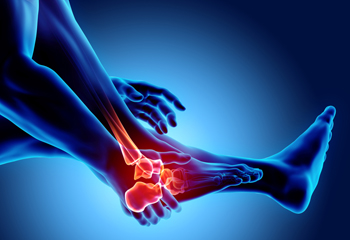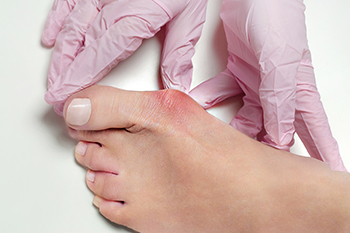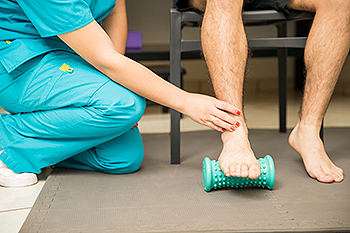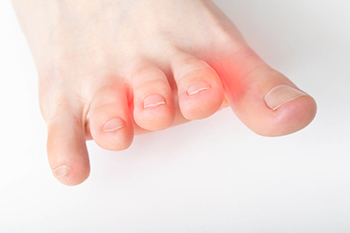Items filtered by date: December 2022
Recognizing Early Signs of Foot Arthritis

Arthritis can affect many parts of the body, including the joints of your feet. There are several types of arthritis that can affect the feet, the most common being osteoarthritis. The joints are covered with articular cartilage, connective tissue that covers the surface of bones in joints. This cartilage reduces friction with joint movement. Arthritis will cause the joints to wear down and lose this cartilage, resulting in the bones rubbing against each other. Soft tissues in joints might also become worn, and this can cause stiff joints that will not function properly. Early signs of foot arthritis include pain, swelling, and stiffness. This ailment can cause acute, or sudden, symptoms or chronic, or long-lasting, symptoms. When osteoarthritis affects the feet, it is usually the joint in the big toe that is first impacted. However, this kind of arthritis can also affect the midfoot. If you have pain in your feet for any reason, or think you might have arthritis, see a podiatrist who can properly evaluate your condition and offer treatment options to provide relief.
Arthritis can be a difficult condition to live with. If you are seeking treatment, contact Amir Shalev, DPM from Complete Foot & Ankle Care. Our doctor can provide the care you need to keep you pain-free and on your feet.
Arthritic Foot Care
Arthritis is a joint disorder that involves the inflammation of different joints in your body, such as those in your feet. Arthritis is often caused by a degenerative joint disease and causes mild to severe pain in all affected areas. In addition to this, swelling and stiffness in the affected joints can also be a common symptom of arthritis.
In many cases, wearing ill-fitting shoes can worsen the effects and pain of arthritis. Wearing shoes that have a lower heel and extra room can help your feet feel more comfortable. In cases of rheumatoid arthritis, the arch in your foot may become problematic. Buying shoes with proper arch support that contour to your feet can help immensely.
Alleviating Arthritic Pain
- Exercises that stretch the foot can prevent further pain and injury and increase mobility
- Most of the pain can be alleviated with anti-inflammatory drugs, heat, and topical medications
- Massages can help temporarily alleviate pain.
It is best to see your doctor for the treatment that is right for your needs and symptoms. Conditions vary, and a podiatrist can help you determine the right method of care for your feet.
If you have any questions, please feel free to contact our office located in Las Vegas, NV . We offer the newest diagnostic tools and technology to treat your foot and ankle needs.
Are You Suffering From Ingrown Toenails?
Will Bunions Go Away on Their Own?

There is no mistaking what a bunion is. It is a common foot deformity that can develop from wearing shoes that are too tight and is noticeable by the small bony protrusion that is seen on the side of the big toe. Bunions that are left untreated may grow and push the other toes toward each other. This can present difficulty in walking and medical attention is often sought for comfort and relief. Research has shown a bunion may also be caused by genetic factors in addition to medical conditions such as various types of arthritis. People who are afflicted with a bunion may need to purchase larger shoes to accommodate it and mild relief may be found when a protective pad is worn over it. Bunions do not go away on their own and it is strongly suggested that a podiatrist be consulted who can prescribe orthotics or recommend surgery for permanent removal.
If you are suffering from bunion pain, contact Amir Shalev, DPM of Complete Foot & Ankle Care. Our doctor can provide the care you need to keep you pain-free and on your feet.
What Is a Bunion?
Bunions are painful bony bumps that usually develop on the inside of the foot at the joint of the big toe. As the deformity increases over time, it may become painful to walk and wear shoes. Women are more likely to exacerbate existing bunions since they often wear tight, narrow shoes that shift their toes together. Bunion pain can be relieved by wearing wider shoes with enough room for the toes.
Causes
- Genetics – some people inherit feet that are more prone to bunion development
- Inflammatory Conditions - rheumatoid arthritis and polio may cause bunion development
Symptoms
- Redness and inflammation
- Pain and tenderness
- Callus or corns on the bump
- Restricted motion in the big toe
In order to diagnose your bunion, your podiatrist may ask about your medical history, symptoms, and general health. Your doctor might also order an x-ray to take a closer look at your feet. Nonsurgical treatment options include orthotics, padding, icing, changes in footwear, and medication. If nonsurgical treatments don’t alleviate your bunion pain, surgery may be necessary.
If you have any questions, please feel free to contact our office located in Las Vegas, NV . We offer the newest diagnostic and treatment technologies for all your foot care needs.
Plantar Fasciitis Is a Common Foot Condition That Needs Podiatric Attention

The majority of plantar fasciitis symptoms will worsen without medical treatment. This condition is the inflammation of the plantar fascia, and it is considered to be one of the most common causes of heel pain. This is the portion of tissue that is located on the sole of the foot and connects the heels to the toes. The plantar fascia is responsible for shock absorption in addition to supporting the arch and the bottom of the foot. This condition can happen when the plantar fascia is stretched beyond its normal range, and it can happen from wearing shoes that do not fit correctly. Additionally, it is common among people who frequently run long distances, run on uneven surfaces, or stand for the majority of the day. The symptoms that many people experience with this condition can include severe pain and tenderness, swelling, and it can be difficult to walk. This may be worse in the morning upon arising, or after sitting for long periods of time. Plantar fasciitis generally gets worse before medical attention is sought. If you are afflicted with this condition, please consult with a podiatrist who can properly treat this condition.
Plantar fasciitis is a common foot condition that is often caused by a strain injury. If you are experiencing heel pain or symptoms of plantar fasciitis, contact Amir Shalev, DPM from Complete Foot & Ankle Care. Our doctor can provide the care you need to keep you pain-free and on your feet.
What Is Plantar Fasciitis?
Plantar fasciitis is one of the most common causes of heel pain. The plantar fascia is a ligament that connects your heel to the front of your foot. When this ligament becomes inflamed, plantar fasciitis is the result. If you have plantar fasciitis you will have a stabbing pain that usually occurs with your first steps in the morning. As the day progresses and you walk around more, this pain will start to disappear, but it will return after long periods of standing or sitting.
What Causes Plantar Fasciitis?
- Excessive running
- Having high arches in your feet
- Other foot issues such as flat feet
- Pregnancy (due to the sudden weight gain)
- Being on your feet very often
There are some risk factors that may make you more likely to develop plantar fasciitis compared to others. The condition most commonly affects adults between the ages of 40 and 60. It also tends to affect people who are obese because the extra pounds result in extra stress being placed on the plantar fascia.
Prevention
- Take good care of your feet – Wear shoes that have good arch support and heel cushioning.
- Maintain a healthy weight
- If you are a runner, alternate running with other sports that won’t cause heel pain
There are a variety of treatment options available for plantar fasciitis along with the pain that accompanies it. Additionally, physical therapy is a very important component in the treatment process. It is important that you meet with your podiatrist to determine which treatment option is best for you.
If you have any questions, please feel free to contact our office located in Las Vegas, NV . We offer the newest diagnostic and treatment technologies for all your foot care needs.
What Can Cause Morton’s Neuroma?

The foot condition that is known as Morton’s neuroma can cause debilitating pain and discomfort. This is an ailment that affects the nerve which lies between the third and fourth toes, causing it to become thickened and irritated. It is a condition that can be common among women who frequently wear high heels. These types of shoes generally have little area in the toe box, prohibiting the toes to move freely. Patients who have Morton’s neuroma often liken the pain in their feet to having a pebble or marble in their shoe. Additionally, there may be a burning sensation in the ball of the foot, as a result of extreme inflammation. There may be existing conditions affecting the feet which can lead to getting this condition, including bunions, flat feet, or high arches. A proper diagnosis consists of pressing on specific areas of the affected foot, and an X-ray may be taken to rule out fractures or arthritis. The discomfort from this ailment is difficult to ignore, and if you are afflicted with this type of pain, please schedule an appointment with a podiatrist as quickly as possible who can help you to find relief.
Morton’s neuroma is a very uncomfortable condition to live with. If you think you have Morton’s neuroma, contact Amir Shalev, DPM of Complete Foot & Ankle Care. Our doctor will attend to all of your foot care needs and answer any of your related questions.
Morton’s Neuroma
Morton's neuroma is a painful foot condition that commonly affects the areas between the second and third or third and fourth toe, although other areas of the foot are also susceptible. Morton’s neuroma is caused by an inflamed nerve in the foot that is being squeezed and aggravated by surrounding bones.
What Increases the Chances of Having Morton’s Neuroma?
- Ill-fitting high heels or shoes that add pressure to the toe or foot
- Jogging, running or any sport that involves constant impact to the foot
- Flat feet, bunions, and any other foot deformities
Morton’s neuroma is a very treatable condition. Orthotics and shoe inserts can often be used to alleviate the pain on the forefront of the feet. In more severe cases, corticosteroids can also be prescribed. In order to figure out the best treatment for your neuroma, it’s recommended to seek the care of a podiatrist who can diagnose your condition and provide different treatment options.
If you have any questions, please feel free to contact our office located in Las Vegas, NV . We offer the newest diagnostic and treatment technologies for all your foot care needs.

